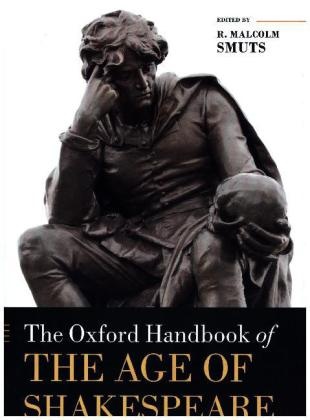Read more
Zusatztext Heavily footnoted, scrupulous, succinct, thoughtful, synthetic but also original- it is a collection I'll return to over and over again in both my research and my teaching. Informationen zum Autor R. Malcolm Smuts, Emeritus Professor of History at the University of Massachusetts Boston, has had a lifelong interest in interdisciplinary scholarship on early modern Britain and Europe. His publications include Court Culture and the Origins of a Royalist Tradition in England (1987); Culture and Power in England 1585-1685 (1998) and several edited collections and articles on aspects of political and cultural history. Klappentext he Oxford Handbook of the Age of Shakespeare offers literary scholars a variety of perspectives, insights and methodologies found in current historical work that inform the study of Shakespeare and his contemporaries. Zusammenfassung The Oxford Handbook of the Age of Shakespeare presents a broad sampling of current historical scholarship on the period of Shakespeare's career that will assist and stimulate scholars of his poems and plays. Rather than merely attempting to summarize the historical 'background' to Shakespeare, individual chapters seek to exemplify a wide variety of perspectives and methodologies currently used in historical research on the early modern period that can inform close analysis of literature. Different sections examine political history at both the national and local levels; relationships between intellectual culture and the early modern political imagination; relevant aspects of religious and social history; and facets of the histories of architecture, the visual arts and music. Topics treated include the emergence of an early modern 'public sphere' and its relationship to drama during Shakespeare's lifetime; the role of historical narratives in shaping the period's views on the workings of politics; attitudes about the role of emotion in social life; cultures of honour and shame and the rituals and literary forms through which they found expression; crime and murder; and visual expressions of ideas of moral disorder and natural monstrosity, in printed images as well as garden architecture. Inhaltsverzeichnis Introduction: Reflections on Interdisciplinary Frontiers Part I: Politics William Cecil Lord Burghley and the Management of Elizabeth's England The Earl of Essex Robert Cecil and the Transition from Elizabeth to James I James I and the Consolidation of British Monarchy? War, Soldiers and High Politics under Elizabeth I Shakespeare, the Irish and Military Culture Catholicism and Tyranny in Shakespeare's Warwickshire Ancient Liberties, Royal Honour and the Politics of Commonweal in English Forests Part II: Intellectual Culture and Political Thought and Imagination Poets, Patronage and the Prince's Court The Theatre and the 'Post-Reformation Public Sphere' Rhetorical Training and the Elizabethan Grammar School English Vernacular Historical Writing and Holinshed's Chronicles European Historiography in English Political Culture Roman History, Essex and Late Elizabethan Political Culture Other Republicanisms The Gordian Knot of Policy: Statecraft and the Prudent Prince Seneca and English Political Culture David Hume, Richard Verstegan and the Battle for Britain The Politics of Race in England, Scotland and Ireland Part III: Aspects of Religious Culture English Catholics and the Continent The Bible in English Culture: The Age of Shakespeare Religious Nonconformity and the Quality of Mercy: The Merchant of Venice in Reformation Context Protestantism and the Devil Part IV: Social Beliefs and Practices The Affective Life in Shakespearean England Chivalry and the English Gentleman Elizabethan Verse Libel Gender, Writing Technologies and Early Modern Epistolary Communications The Shamings of Falstaff ...

